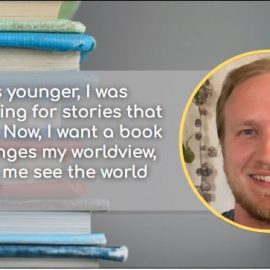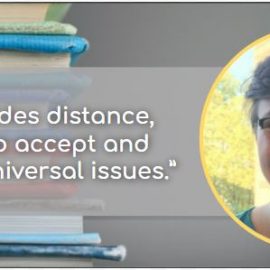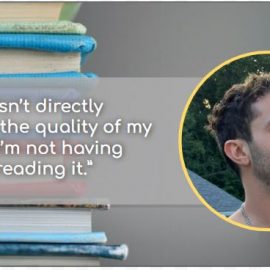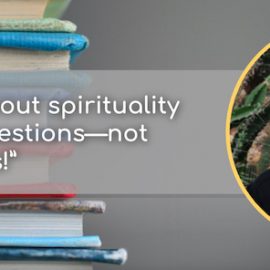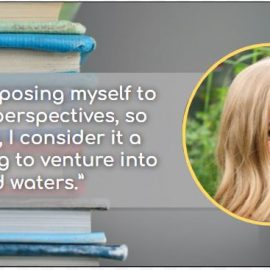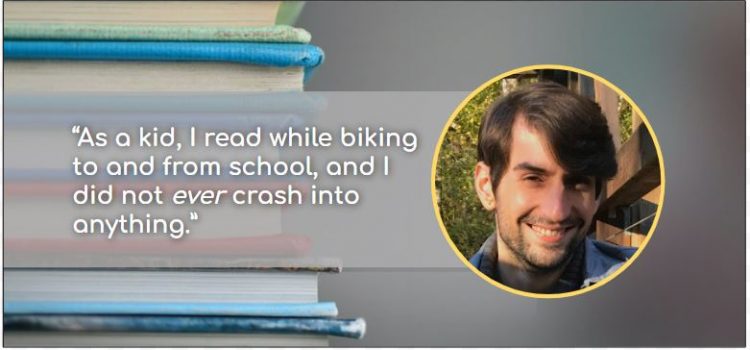
What kind of book does Fabian believe is critically important for every person to read in their lifetime? Through what unconventional method did Fabian learn to read?
Fabian is originally from Switzerland but now lives in the United States. He’s one of Shortform’s scriptwriters for the YouTube channel and enjoys the challenge of tailoring his writing to fit the host and writing in a casual and direct way.
Our Interview With Fabian
Here’s what Fabian had to say about his favorite book genres, authors, and more.
What’s your favorite book and why?
Douglas Adams’ Hitchhiker’s Guide to the Galaxy is a perennial favorite. I’ve read it dozens of times—in German, French, and English. It’s the one for-fun book I’d recommend to anyone, no matter what. Honorable mentions include Garth Nix’s Abhorsen series, Roger Zelazny’s Chronicles of Amber, and anything at all by Anne McCaffrey, Diana Wynne Jones, and Tamora Pierce. I’ll slip in C. J. Cherryh, too, for writing the only sci-fi book I’ve read in which humans are the aliens, and the aliens are … well … the “normal” ones.
What are you reading these days?
My housemate has lent me a series by John Scalzi that begins with the book Old Man’s War. It’s a very interesting sci-fi series in which the eldest members of earthly society can choose to join the intergalactic army rather than passing away peacefully at home. They’re transported off-planet, and nobody knows what happens to them after that. I won’t spoil it, but it’s riveting stuff!
What’s your favorite genre? Why does it intrigue you?
Science-Fiction and fantasy will likely always be my favorites. I’ve always been drawn to this core idea of “a more interesting world.” I find it particularly fascinating to see how authors justify, mechanic-ize and logistify their personal brand of magic, their imaginary future technologies, their fantastical cultures, and so on. It gives the imagination a lot to play with! And, of course, I love that these genres allow an author to just go, “We’re not doing homophobia or sexual assault here. I’m not having it.”
Are there any book genres or tropes that you dislike or refuse to read?
Generally speaking, I prefer books by women about women to books by men about men. I usually find it very difficult to care about cars, guns, business, and dudes getting laid. I’d much rather read, say, Meg Cabot’s The Princess Diaries—which, by the way, owns. There have been some exceptions, though. There’s a truly excellent series by Lee Child about an ex-MP who hitchhikes across the continental US and helps people out by applying generous helpings of wit, compassion, and extreme violence. A kind, older guy who used to come by the convenience store where I worked lent me about 20 of those books—one at a time—and I devoured them. Jack Reacher owns. Don’t talk to me about the Tom Cruise adaptation of those books, though. Tom Cruise unequivocally does not own.
What’s your favorite way to read a book?
A physical copy, all day long, from start to finish in one sitting. A cup of tea and a meal here and there would be ideal. But, if I start a book—and it’s good—I’m not putting it down until it’s done. As a kid, I read while biking to and from school, and I did not ever crash into anything.
What book do you think everyone should read in their lifetime?
I think it’s critically important that everyone read at least one of the many books out there that explain the purpose and value—or lack thereof—of “The Rules.” Books like don Miguel Ruiz’s The Fifth Agreement—which is in our Shortform library—or Eckhart Tolle’s A New Earth—which likely will be at some point. By the time you’re of college age, you’ve absorbed so many rules about how you’re supposed to be, to act, and to live—often without really considering whether those rules are right for you or whether you benefit from them. And books like these help you revisit those rules, analyze them, challenge them, and throw away the ones that make you sick.
Was there a specific book that sparked your love of reading?
It wasn’t a specific book so much as it was the way I learned to read. My mom tells me that, when I was four going on five, I’d follow her around the house with a book, asking her what sounds specific letters made. Never a whole word—always one letter at a time. That’s how I learned to read, and I think the result was that reading felt like it was mine. I figured it out myself, and I owned every word I read because I read it “by myself.” Then we moved from Switzerland to England, and I decided that the best way to learn English was to read the entire Oxford English Dictionary from cover to cover. So, yeah, I’ve always been at least mildly insane.
Do you have any guilty pleasure books?
This is not a concept I believe in—I either like something or I don’t. Guilt has no business intruding on my pleasures. If we’re willing to expand the concept of “books,” I’ll say that I’ve read an unreasonable amount of fan-translated manga, and that for a while it was considered shameful to do that. And maybe it’s still weird to say I think Homestuck genuinely owned, and that perhaps it was only considered “cringe” because it was a piece of clearly neurodivergent content by and for neurodivergent people.
Have any books you’ve read caused you to make any life changes or to change or develop any habits?
If we’re still willing to expand the concept of “books” a little—maybe all the way out to “written material,” I can say that subscribing on impulse to Jezebel in my early 20s was strongly formative. I think it was really important for me, at that age, to be reading the described, lived experiences of women on a daily basis. It opened a window for me into another area of life in which “The Rules” and “The Facts” were clearly just wrong. Learning why feminism matters and why it’s important went a long way to making me the person I am today. It taught me to always listen first—and to listen seriously, intentionally, and without judgment. That’s an unbelievably critical skill, and it’s made me a ton of amazing friends!
Are there any books you had to read for Shortform that you thought you wouldn’t like and ended up loving?
Maybe “loving” isn’t the right word, but I did some work on David Deida’s The Way of the Superior Man, and—boy—did I instantly hate it. That book includes stunning phraseology such as “‘fuck’ the world the way you’d fuck your woman,” which is a quote I still wish I could bleach-scrubbingly remove from my brain. Despite that—despite being very aggressively written for a brutally straight, ex-frat business major—many of his lessons are truly, genuinely valuable. The one I mention here, for example, really means, “Whatever you do, do it wholeheartedly, with your full focus and attention.” Once I got past the language, I found a lot to appreciate, and I think that writing style probably does appeal to the kind of guy who really needs to hear what he’s saying.
What are your favorite books in the Shortform library and why?
I worked on our guides to The Fifth Agreement and The Anatomy of Peace—so I’m admitting to a bias here—and I think they’re really valuable reads. The Anatomy of Peace talks about how to communicate and connect with people you’ve become horribly disconnected from—and how to rebuild those relationships. It explains how we become biased against people we’ve had conflicts with—and how to return to seeing them as whole people again. It’s pretty amazing stuff.
And, as I’ve mentioned, The Fifth Agreement is a book about becoming aware of The Rules we’ve agreed to live by and re-examining them. That’s important work, and many of us never do it. It’s easy to end up in a very unhappy place just because you’re still trying to be something you only think you have to be!
Fabian’s Book Recommendations
- Hitchhiker’s Guide to the Galaxy by Douglas Adams
- The Abhorsen series by Garth Nix
- Chronicles of Amber by Roger Zelazny
- The Princess Diaries by Meg Cabot
- The Fifth Agreement by don Miguel Ruiz
- A New Earth by Eckhart Tolle
About the Series
At Shortform, we want to give our employees names and faces so you can get to know the people who make the magic happen. That’s why we’re doing this series where we interview our employees and share their thoughts and opinions. You can check out more employee interviews here.


